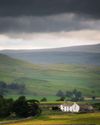
If you slavishly follow the rules of composition, you will create work that is competent but unimaginative and predictable. However, it is not simply the case that ‘rules are made to be broken’. The rules have their uses. They can be used as a starting point – a way of looking at a subject that will enable you to get the best out of it. If you understand the rules and explore them while constructing an image, your composition is likely to improve – even if you end up with a picture that breaks every rule in the book.
Placing the horizon
According to the rules, the horizon line should be placed in the bottom or top third of the picture, depending on how much interest is present in the sky. However, there are plenty of situations in which you can consider other approaches. For example, if you are confronted by a scene that has little interest in the foreground or middle distance, and a particularly dramatic sky, placing the horizon at the bottom of the frame can work effectively.
This also has the effect of increasing a sense of emptiness and isolation, particularly in minimalist compositions. On the other hand, if the sky is clear and lacking in interest, placing the horizon right at the top of the frame – or excluding it altogether – is often the best option.
Placing the horizon in the centre of the frame is also a viable option in many situations, for example, when shooting a scene in which the sky is reflected in water. Placing the horizon in the centre of the frame can also enhance an atmosphere of calm and tranquillity, and, in the right lighting conditions, can be an effective treatment of the subject.
This story is from the {{IssueName}} edition of {{MagazineName}}.
Start your 7-day Magzter GOLD free trial to access thousands of curated premium stories, and 9,000+ magazines and newspapers.
Already a subscriber ? Sign In
This story is from the {{IssueName}} edition of {{MagazineName}}.
Start your 7-day Magzter GOLD free trial to access thousands of curated premium stories, and 9,000+ magazines and newspapers.
Already a subscriber? Sign In

David duChemin
The Canadian wildlife photographer gives Niall Hampton a flavour of his latest book Light, Space & Time, and his talk at The Photography Show

Scanning ahead...
In a make-or-break year for the camera market, Jon Devo suggests throwing out the playbook

Click, click, gone
Sean McCormack tries ON1 Photo RAW's new Generative Erase

Blur the background
Wendy Evans explains how to change the depth of field in telephoto shots using the Lens Blur tool in Lightroom or Camera Raw

Bring the drama with colour-grading tools
Discover how to use adjustment layers in Affinity Photo to add mood and colour to a lacklustre image, with Wendy Evans

Optimise your phone shots in Photoshop
Smartphones are our most useful cameras, so let's enhance our shots, says James Abbott

Expand your images
Crop outside your frame in Photoshop and discover a clever hack for detailed Al-generated fills with James Paterson

Shot of the month
Benjamin Yavar, winner of the Photography category of 2024's ViewSonic ColorPro Awards

CAMERA CLINIC - Master the art of modern photography
Architecture is a huge subject in photography.

HARNESS THE POWER OF RAW!
Take your captures to the next level with this 10-step tutorial for Adobe Lightroom Classic CC. Dan Mold is your expert guide...